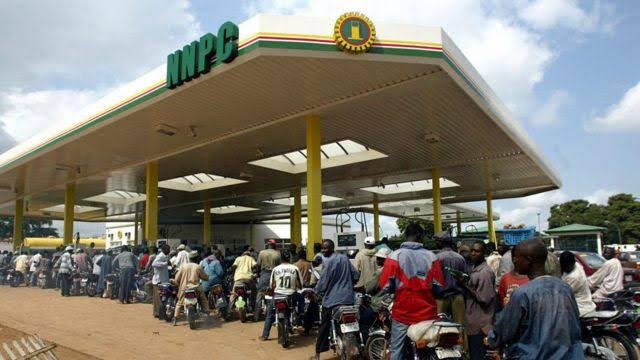Motorists in the Federal Capital Territory FCT Abuja have expressed shock at the sudden raising of the pump price of Premium Motor Spirit popularly called petrol to N617 per litre on Tuesday morning.
From May 29, 2023 when President Bola Tinubu removed fuel subsidy, the petrol Pump Price had remained N537 at NNPCL retail stations but on Tuesday morning July 18, 2023, Nigerians woke up to be greeted with a new pump price of petrol N617 per litre, with motorists describing the move as arbitrariness and insensitivity on the part of the management NNPCL.
Mr. Okey Ujah, a trader, said that Nigerians are yet to come to terms with the pump price of N537 per litre, only to be confronted with the new price, wondering how the NNPCL and other marketers arrived at the N617 per litre pump price.
“What have the masses done to deserve this type of hardship. Imagine that we are still trying to recover from the harsh economic difficulties inflicted on us by the initial price of N537 when the subsidy removal happened. Now this! How do they want the poor Nigerians to cope? Who is calculating the price with them, and if I may ask how do they arrive at N617 per litre all of a sudden?” Wondered Ujah.
Mrs. Fatima Olaoye, another motorists at one of the filling stations at Abacha Road axis of Mararaba, in neighbouring Nasarawa State, described the sudden hike in pump price of petrol as arbitrary.
Olaoye accused the Nigerian Midstream and Downstream Petroleum Regulatory Authority, (NMDPRA) otherwise known as The Authority as not living up to expectations of protecting the consumers against the arbitrariness of the marketers whose sole aim is to make profits.
“I learnt the NMDPRA met with petrol marketers yesterday and today there’s price increase. When the agency meant to protect the masses are in bed with the predators, this is what you get. Arbitrary pricing!” She said.
Another motorists, Ikenna Obiefuna, said the price hike would bring with untold hardship to the people, warning that if Labour Unions and the regulators do not urgently do something about it, the pump price of petrol would soon hit N1000 per litre.
“Since the subsidy was removed the effects had pushed more Nigerians below the poverty lines with the attendant hardship. Not many can afford to move about now, let alone afford other basic necessities like healthcare, and adequate feeding. Now can you imagine what will happen with this new price of N617 per litre. Let me tell you, unless the labour unions, and the regulators rise to the occasion, this price will keep rising. Trust Nigerians business. Soon the pump price will hit N1000 per litre” he said.
However, a source from the NMDPRA who requested not to be named told our Correspondent that the price hike may not be unconnected with the deregulation of the product, adding that the rising price of petrol in the international market, the exchange rate and costs of logistics, may have forced the price to go up.
According to him, the increase in fuel price should not come as a surprise because the sector has been deregulated and prices are expected to reflect the current economic realities.
“Here are the three major factors that could have been responsible for the price increase in petrol.
“The recent increase the price of crude oil in the international market: When President Bola Tinubu removed fuel subsidy on May 29 this year, the price of crude oil was about $74.75 per litre. However, as of the end of trading on July 17, the price of crude oil had risen to $82.74 per litre. This implies that between May 29 and July 17, the price of crude oil in the international market had risen by $7.99 per litre or 10.68 per cent. What this means is that since Nigeria still rely on imported petrol to meet local demand for the product and with the deregulation of the sector, the price of petrol will continue to reflect the international price of crude oil.
“The increase in the Dollar to Naira exchange: Another possible factor that could have led to the increase in the price of petrol is the increase in the exchange rate between the Naira and the Dollar.
“Recall that when the President announced the removal of fuel subsidy on May 29, the Naira was exchanging at N740 to the Dollar and the foreign exchange market had not been liberalized.
“But with the liberalization of the foreign exchange market following the removal of Mr Godwin Emefiele as the Governor of Central Bank of Nigeria, the Naira has continued to lose its value in the foreign exchange market.
“Currently, the Naira is trading at about N829 to a dollar due to persistent pressure from Nigerians and investors for foreign exchange to conduct international transactions.
“With the removal of petrol subsidy, oil marketers are now free to source their foreign exchange anywhere around the world to import petroleum products and then recover their costs without impediments. This is would be expected to have an effect on the price of the product.
“The third factor is the high transportation costs: The distribution of petroleum products across the country is done through the movement of trucks. And this was why, during the period of fuel subsidy, the Federal Government came up with the Petroleum Equalization Fund through Decree 9 of 1975 (as amended by Decree Number 32 of 1989 now chapter 352 of the Laws of the Federation).
“The main objective of that Fund is to ensure price uniformity of petroleum products via the reimbursement of marketers for losses they incur in trucking products from depots to their filling stations anywhere in Nigeria.
“But with deregulation of the downstream petroleum sector following the removal of fuel subsidy, the Federal Government has now stopped the payment of the fund. Since then, a lot of things have changed. What this means is that oil marketers will be solely responsible for how their products are transported from the depot to their respective petrol stations. The implication of this is that the price of movement of this product would be transferred to consumers of petrol and this is expected to have an impact on the final price of petrol” he said.











